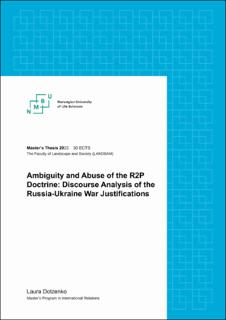| dc.description.abstract | Can Russia justify its aggression against Ukraine? Not according to International Law, but perhaps according to the jus ad bellum criterion, both traditional and contemporary. The ambiguous application, and possibly nature, of humanitarian interventions might provide a language for justifications and norm contestations. However, justifications about, and legality of, crimes against humanity do not necessarily go hand in hand. Empirically, Russia’s war on Ukraine might provide evidence of geopolitical interests covered in moral justifications, which can enhance the inconsistency, subjectivity and hypocrisy of the R2P pillars. The ongoing, largest scale of violence in Europe since the WWII, has demonstrated types of discourse and securitization which are interesting to analyze, explain and understand.
Although war and humanity have existed alongside for centuries, the modern sovereign state security is turning towards human security. The international community is trying to condition the sovereignty to responsibility, in order to make the state responsible for human rights and lives. Whether that is permissive or preventive of destructive interventions, is a complex debate with empiric examples stretching between both ends. According to Russia, its actions in Ukraine are preventing a humanitarian crisis. From another perspective, it seems as though Russia’s geopolitical interests have permitted an illegal intervention. When speaking of intervention, it is unclear whether Russia sees itself as an intervener in the sovereign country of Ukraine, or as a requested assistance to the self-declared Republics of Lugansk and Donetsk, or if Russia “intervenes” in a territory it views as a “common Motherland”.
Russia might be behaving as a traditional, regional hegemon in similar manner to the Western interventional practices. In light of the eastward NATO expansion, perhaps there truly is a fear of the imbalance of global order and power-threat relation. With pro-Russian arguments about self-defense, and pro-Ukrainian voicing of mass atrocity crimes in Ukraine, the discursive contrasts are significant. Appeals to justice are in this case polarized, and perhaps unfortunate for the further development of, and commitment to, the R2P. | |
